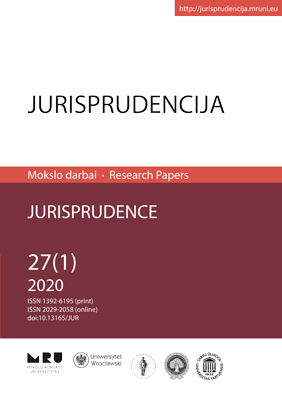VALSTYBINĖS ŽEMĖS NUOMOS SUTARTYS: TEISINIO REGULIAVIMO ESMĖ IR PRAKTINĖS PROBLEMOS
STATE LAND LEASE CONTRACTS: THE ESSENCE OF LEGAL REGULATION AND PRACTICAL PROBLEMS
Author(s): Evaldas Klimas, Algis NorkūnasSubject(s): Law, Constitution, Jurisprudence
Published by: Mykolas Romeris University
Keywords: Public Land Lease; Public Land Lease Contracts Termination; Legitimate Expectations; Land Use Law;
Summary/Abstract: On the 18th of October 2019, the conference “Insecurity and legitimate expectations of the Real Estate developers in long term relation with the state: what should be expected tomorrow, what decisions should be made today?” was held in the Parliament of the Republic of Lithuania. At this conference, the issues of land lease implementation, the legitimacy of their termination, and related legitimate expectations were raised. Encouraged by the discussions held, the authors of this article analyse the regulation and judicial practice of state-owned land lease contracts (concluded under exceptional circumstances) in terms of their implementation and termination.State-owned land use is strictly regulated by the Land law. State-owned land should not only be used, but should also comply with public needs. Certain rules for the execution of state-owned land lease agreements are indicated in the Land law. One Specific group of such agreements are state-owned land lease agreements, concluded for the use of buildings built on the state-owned land. The Constitutional Court of the Republic of Lithuania additionally indicates that the legitimate expectations of land users should be met. Therefore, national courts balance the strict regulations and interests of public needs and private interests.In practice, the main judicial cases relating to state-owned land lease implementation can be grouped into three categories. Firstly, only self-functioning buildings are granted the right to a state-owned land lease. Secondly, the parcel of the leased land should satisfy the needs of the building’s use. Thirdly, if the public land user infringes on the imperative requirements of the public land use and essentially infringes on the concluded lease agreement, and then refuses to eliminate such infringement, the public land trustee not only has the right, but also is demanded to initiate the termination of the land use agreement. If the public land user eliminates the infringement, the land lease agreement should stay in effect.
Journal: Jurisprudencija
- Issue Year: 27/2020
- Issue No: 1
- Page Range: 75-94
- Page Count: 20
- Language: Lithuanian

